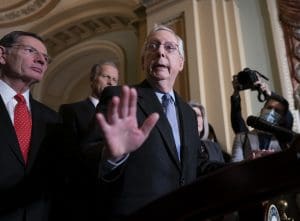McConnell falsely claims GOP isn't doing anything to make voting harder
But Republicans in 17 states made it harder to vote last year.

Senate Minority Leader Mitch McConnell wants Americans to believe that there is no GOP effort to make it harder to vote. But red states passed dozens of new laws last year alone to do just that.
In a memo released Sunday, McConnell’s office bragged that the Kentucky Republican and his caucus “have repeatedly stood up to the left and their Big Lie that there is some evil anti-voting conspiracy sweeping America.” It accused Democrats of trying “to use fake hysteria to break the Senate and silence millions of Americans’ voices so they can take over elections and ram through their radical agenda.”
This argument was nearly identical to one made by McConnell at a press conference last Tuesday. “It appears as if the majority leader is hellbent to try to break the Senate,” he said at the time. “His argument is that somehow state legislatures across the country are busily at work trying to make it more difficult for people to vote. Of course, that’s not happening anywhere in America.”
In a response memo provided to the Hill on Monday, Majority Leader Chuck Schumer’s office noted that McConnell was trying to “gaslight the American people” and that GOP state legislators are “pursuing and passing legislation that would dramatically restrict voting, putting our Democracy at risk.”
According to a December 2021 roundup by the Brennan Center for Justice at New York University, 19 states — 17 of which have a GOP governor, a Republican-led legislature, or both — enacted at least 34 laws last year that will make it harder for Americans to vote.
These include laws that shortened the time window to apply for an absentee ballot, restricted who could help return absentee ballots, reduced opportunities for early voting, and even banned providing water and snacks to people waiting in line to vote.
Last week, Schumer (D-NY) announced that voting rights legislation would be a key priority for this month.
Though the House of Representatives passed the John Lewis Voting Rights Advancement Act of 2021 last August, Senate Republicans have filibustered the Democratic majority’s attempts even to bring up its version of the bill for debate. Just one Republican — Sen. Lisa Murkowski of Alaska — joined every Democratic senator in backing the legislation to restore preclearance requirements for states and localities with a recent history of discriminatory voting laws.
Schumer promised last Monday that he would try again to advance the bill before Martin Luther King Jr. Day and that if Republicans do not “change course” he would force a vote on a change to the filibuster rules.
“As Majority Leader Schumer has said, Senator McConnell’s absurd assertion is a transparent attempt to muddy the water and gaslight the American people about the truth,” Sen. Patrick Leahy (D-VT), lead Senate sponsor of the Voting Rights Advancement Act, told the American Independent Foundation on Monday.
“And the truth is that his party, state by state and in Congress, is intent on making it harder for millions of Americans to vote and participate in our democracy,” Leahy added.
Sean Morales-Doyle, acting director of the voting rights and elections program for the Brennan Center, told the American Independent Foundation that McConnell’s claim was simply false. “To suggest that there isn’t an effort to undermine our democracy and our voting rights is ignoring reality,” he observed.
Morales-Doyle noted that the Center has been tracking voting legislation across the country for the past 11 years and has never seen as much voter suppression as it did last year.
“One out of every three laws restricting access to voting since 2011 passed in 2021,” he said. “It’s impossible to know how many people will be blocked, but our analysis shows not small numbers of voters.”
Morales-Doyle said passage of the John Lewis Voting Rights Advancement Act and the Freedom to Vote Act, which “sets a floor for what federal elections must look like,” would “do a great deal to combat what we’ve seen in recent years.”
In a press release last week, Wade Henderson, interim president and CEO of the Leadership Conference on Civil and Human Rights, invoked the first anniversary of the Jan. 6 Capitol insurrection in calling for passage of both bills to preserve democracy.
“It is clear our leaders must safeguard elections for all Americans, and arcane Senate rules must not be a barrier to the ballot box or used as a tool to undermine democracy. The Senate must reform its rules and pass the John Lewis Voting Rights Advancement Act and the Freedom to Vote Act.”
Voting rights legislation used to be a bipartisan topic. As recently as 2006, Republican President George W. Bush signed a Voting Rights Act reauthorization that passed 98-0 in the Senate.
But not a single House Republican voted in favor of the John Lewis Voting Rights Advancement Act last year. And not a single Republican senator supported the Freedom to Vote Act in October.
This post was updated to include the most recent findings by the Brennan Center for Justice. The center has found that states have passed 34 laws restricting access to voting, not 33.
Published with permission of The American Independent Foundation.
Recommended

Assisted living home lawsuit, citations add to controversy over Hovde’s nursing home remarks
Campaign says GOP Senate hopeful has no responsibility for facility and lawsuit lacks merit
By Erik Gunn, Wisconsin Examiner - April 24, 2024
Democrat Lucas Kunce’s fundraising surge could be a game changer for Missouri Senate race
Kunce’s opponent, incumbent Sen. Josh Hawley, has staunch anti-abortion views that could jeopardize his reelection bid.
By Jesse Valentine - April 18, 2024
Republican Eric Hovde’s company exposed workers to hazardous chemical
Employees were put at risk to develop asthma or chronic bronchitis.
By Jesse Valentine - April 12, 2024







































































